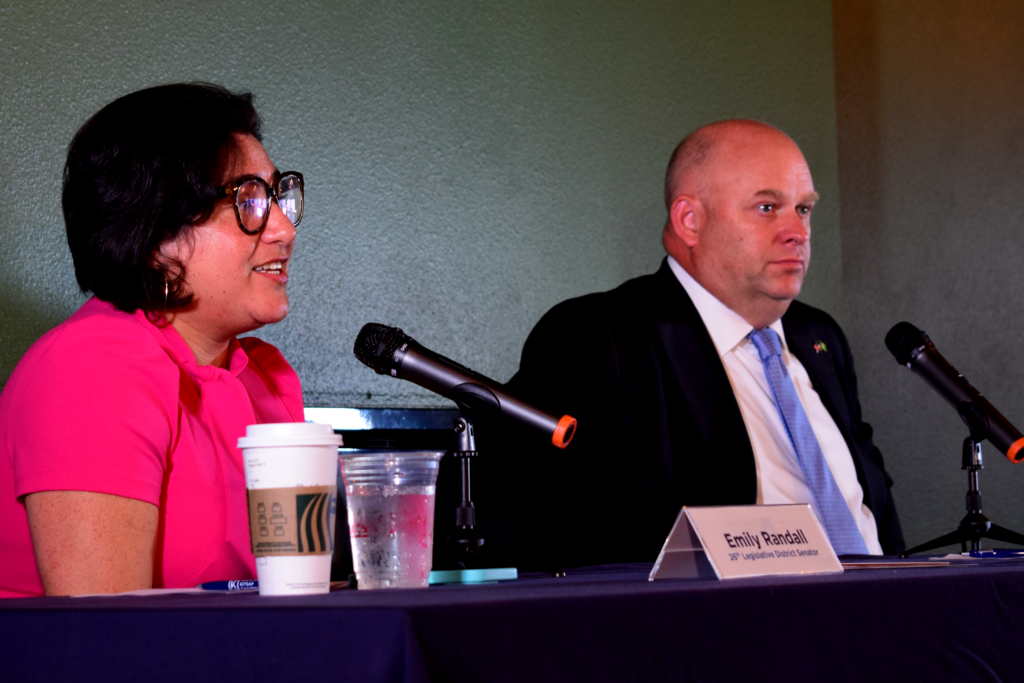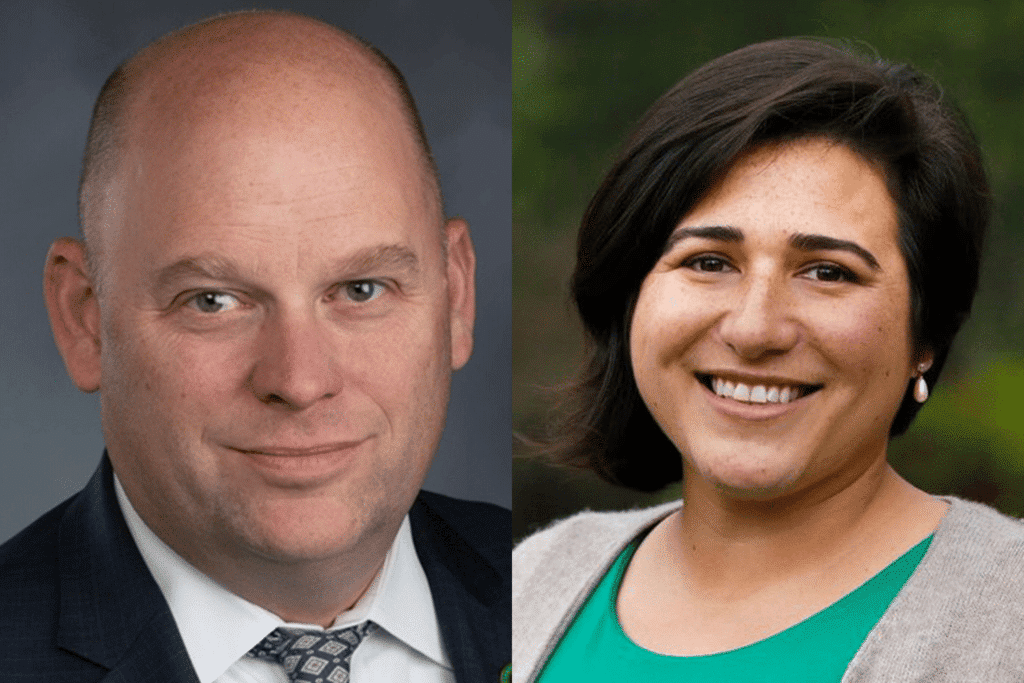Community Government
Sixth District candidates talk health care, economy and bipartisanship
BREMERTON – Congressional candidates Emily Randall and Drew MacEwen discussed fiscal policy, their ties to the region and commitment to bipartisanship during a candidate forum in Bremerton Tuesday morning, Sept. 17.
The event, hosted by the Greater Kitsap Chamber of Commerce, comes less than two months before voters choose a replacement for longtime Rep. Derek Kilmer, D-Gig Harbor. After over a decade representing Washington’s Sixth Congressional District, he is not seeking re-election.
The district — including the Olympic and Kitsap Peninsulas, plus Gig Harbor and a large slice of Tacoma — by all accounts remains partial to Democrats. Making Randall, a Bremerton Democrat and state senator representing the 26th Legislative District, the front runner.

Democrat Emily Randall, left, and Republican Drew MacEwen. Photo by Conor Wilson
Democrats outpaced Republicans in primary
Randall was raised near Port Orchard and worked for Planned Parenthood and other nonprofits before being elected to the Legislature in 2018. She won the August primary, surprising fellow Democrat Hilary Franz, the state lands commissioner whom Kilmer endorsed.
Collectively, the two Democrats won nearly 60% of the primary vote. MacEwen and Republican primary rival Janis Clark combined for about 38%.
Opening up the forum Tuesday, Randall said she knows how to work across the aisle and get legislation passed. She emphasized holding office in one the state’s two “purple districts,” where legislative seats are held by members of both parties.
Randall added that her dad is a Republican.
“We spent a lot of time at our kitchen table having loving and respectful arguments about the right solution,” she said. “I have tried to bring that experience with me. To knock on the doors of my neighbors to work with my colleagues.”
Health care is Randall’s priority
Randall said health care would be her top priority, noting that parts of the district are experiencing a shortage of primary care providers and affordable care. She said her sister has complex disabilities and Medicaid provides her a safety net that she would not otherwise have.
“I think we all deserve that. We all deserve access to the health care we need when and where we need it at a cost we can afford,” she said. “And we are not experiencing that.”
MacEwen is a Republican state senator from Union, representing the 35th Legislative District. He moved to the region in the 1990s as U.S. Navy submariner. He now works as president of Falcon Financial, a financial advisory company he founded.
First elected to the state House in 2012, MacEwen said he was encouraged to run by members of the Mason County business community. He was elected to the state Senate in 2022.

Drew MacEwen and Emily Randall
Economy is MacEwen’s priority
MacEwen shared Randall’s enthusiasm for bipartisanship. He said his experience working in the state’s minority party gave the skills to build relationships across party-lines. He said his top priority would be focusing on improving the economy, including providing more pathways for education in the trades and strengthening the workforce at Puget Sound Naval Shipyard.
“We’ve got to reinvigorate our trade programs to make sure we’ve got a workforce that can supply a growing economy for this region,” he said. “We see the struggles in our shipyard right now. Some of that is pay-driven but a lot of that is failure to promote the trades.”
Taxes and budgets
Randall and MacEwen went back and forth on tax policies and spending, occasionally re-litigating debates the Legislature had over the past few years.
MacEwen said if elected he would not support new taxes given recent rates of inflation and its impacts on cost of living.
He cast himself as a champion of fiscal responsibility, saying the state and federal governments need to balance their budgets and reign in spending. He said state Democrats have been irresponsible with funds and need to operate more efficiently.
“We don’t have a revenue problem,” he said “We have a spending problem.”
Randall countered that the state’s majority party had made tax reform, including property tax exemptions for vulnerable groups like seniors, veterans and those with low incomes. She said the state made drastic spending cuts after the Great Recession.
“We are still digging ourselves out of that hole,” she said. “Especially when it comes to support and safety net support for people with disabilities.”
Randall said she was proud to support the capital gains tax, a state initiative that levies a 7% tax on sale or exchange of bonds, stocks and business interests. She said the policy taxes the state’s richest residents for the benefit of working families.
Climate Committment Act
She also emphasized the importance of the Climate Commitment Act, legislation creating a cap-and-trade program to reduce greenhouse gasses and reinvest money in infrastructure and transit projects. She said it is important to incentivize electrification and green construction.
“A lot of it comes down to funding. A lot of it comes down to regulation,” she said. “But I think it’s really important to make sure that we are building a future that we can all live in.”
MacEwen was critical of the CCA, calling it a “lack of leadership.” He called for a pragmatic approach to electrification and green energy.
“I support – let’s do it all,” he said. “Let’s see what works and what makes practical sense.”
What’s next
The November general election is Nov. 5. Ballots will be mailed in Mid-October.
Residents can register online before Oct. 28 at vote.wa.gov. In-person only registration goes until Election Day.
